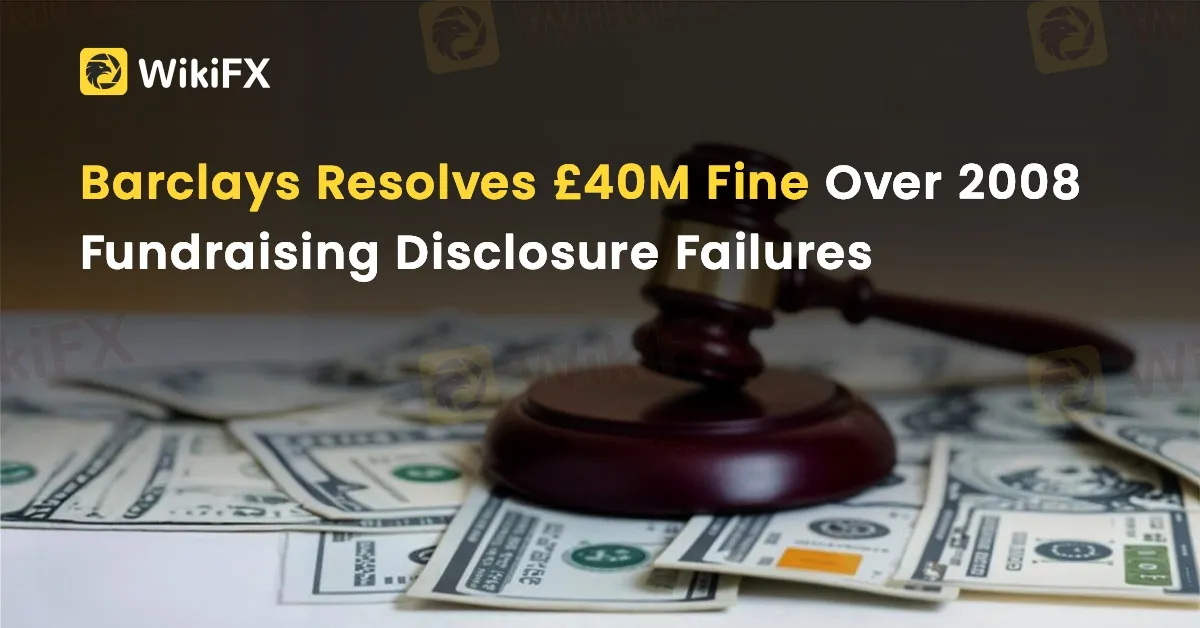简体中文
繁體中文
English
Pусский
日本語
ภาษาไทย
Tiếng Việt
Bahasa Indonesia
Español
हिन्दी
Filippiiniläinen
Français
Deutsch
Português
Türkçe
한국어
العربية
Barclays Resolves £40M Fine Over 2008 Fundraising Disclosure Failures
Abstract:Barclays has reached a settlement with the UK’s Financial Conduct Authority (FCA), agreeing to pay a £40 million fine for failing to adequately disclose arrangements with Qatari investors during its critical fundraising efforts amidst the 2008 financial crisis.

Barclays has reached a settlement with the UKs Financial Conduct Authority (FCA), agreeing to pay a £40 million fine for failing to adequately disclose arrangements with Qatari investors during its critical fundraising efforts amidst the 2008 financial crisis. This agreement marks the conclusion of a protracted regulatory investigation that began in 2013.
The case revolved around undisclosed payments totalling £322 million made by Barclays to Qatari entities through two advisory agreements. These payments were directly linked to Qatari participation in the banks June and October 2008 capital raisings and effectively increased the costs associated with their involvement. The FCA highlighted that this lack of transparency deprived investors of crucial information regarding these financial arrangements.
Regulators initially proposed a £50 million penalty, but the fine was reduced after Barclays withdrew its appeal to the Upper Tribunal. The FCAs enforcement and market oversight joint executive director, Steve Smart, emphasised the gravity of the misconduct, noting its impact on investors who were not provided with all relevant details at the time. However, he acknowledged that the events occurred 16 years ago and that Barclays has since undergone significant organisational changes to improve its practices.

This regulatory resolution comes on the heels of the collapse of a separate criminal case brought by the UKs Serious Fraud Office (SFO) against Barclays and several former executives. The SFO had conducted a five-year investigation into the roles of former Chief Executive John Varley, ex-Middle East investment banking chairman Roger Jenkins, and others. However, the charges did not result in convictions.
In its official statement, Barclays confirmed that it had agreed with the FCA to withdraw its appeals against the regulator‘s findings. The bank reiterated that none of its current board members or senior management were involved in the incidents outlined in the FCA’s notices. The statement also highlighted the substantial improvements made to the banks systems and controls in the years since the 2008 fundraising efforts.
Barclays noted that while it does not accept the FCAs findings, it has chosen to conclude the matter to prioritise the interests of the bank, its shareholders, and other stakeholders. The bank had already accounted for the financial penalty in 2022, ensuring no material financial impact on its operations.
The Barclays settlement underscores the FCA‘s ongoing commitment to addressing corporate misconduct, even years after the events. It also draws comparisons to other recent regulatory actions. Earlier this year, Metro Bank faced a £16.7 million fine for significant anti-money laundering failures that left over £51 billion in transactions insufficiently monitored. Similarly, fines imposed on Starling Bank and Citigroup in 2024 highlight the FCA’s stringent approach to ensuring financial institutions uphold their regulatory obligations.

Disclaimer:
The views in this article only represent the author's personal views, and do not constitute investment advice on this platform. This platform does not guarantee the accuracy, completeness and timeliness of the information in the article, and will not be liable for any loss caused by the use of or reliance on the information in the article.
Read more

Breaking News! Federal Reserve Slows Down Interest Rate Cuts
The latest Federal Reserve meeting minutes show that Fed officials are generally concerned about the upward risks to inflation, suggesting that future rate cuts may slow down.

Beware of Fraudulent Letters: Malaysia’s Securities Commission Issues Warning
The Securities Commission Malaysia (SC) has raised an alarm over fraudulent letters and emails falsely claiming to be from the regulatory body. These fake communications are allegedly tied to illicit investment schemes that seek payments from unsuspecting investors.

Singapore’s New Law Allows Police to Freeze Scam Victims’ Bank Accounts
Singapore has enacted a new law enabling police to freeze bank accounts of scam victims as a last-resort measure to prevent financial losses.

Rising U.S. Corporate Bankruptcies Deepen Economic Concerns
In 2024, 686 U.S. companies filed for bankruptcy, marking the highest number since 2010.
WikiFX Broker
Latest News
Pepperstone Sponsored the "Aston Martin Aramco Formula One Team"
ACY Securities Integrates MetaTrader 5 to Enhnace Copy Trading Service
Soegee Futures Review: Should You Trust This Broker?
Malaysian Pilot Loses RM1.36 Million in UVKXE Investment App Scam
Indonesia officially joins the BRICS countries
Attention! Goldman Sachs Cuts Gold Target to $2910
Inflation Rebounds: ECB's Big Rate Cut Now Unlikely
Carney \considering\ entering race to replace Canada\s Trudeau
High-Potential Investments: Top 10 Stocks to Watch in 2025
Why Is Nvidia Making Headlines Everywhere Today?
Currency Calculator






